Despite its reputation as the Gulf‚Äôs gentle backwater, Qatar has some serious ambition ‚Äď and the wealth to back it up.
‚ÄúWelcome to Doha!‚ÄĚ says Steven Humphrey. He‚Äôs as well placed as any of the local consultants to call Qatar home. Humphrey lived there in the early nineties and has been Davis Langdon's man in Doha since 2006, as director of its Qatar operations. He drinks his coffee in the Arabic style, and is slightly sniffy about life elsewhere in the Gulf. ‚ÄúIn Dubai, you could be anywhere. Here you really feel like you‚Äôre in the Middle East.‚ÄĚ
That’s one reason why many companies approach the country with trepidation. Though a huge market, ripe with opportunity, Qatar is a more conservative state than its Emirati neighbours and has a reputation for bureaucracy. Companies complain about onerous annual registration and lengthy waits for visas, not to mention the difficulty of attracting staff to work in a quiet backwater an hour’s flight from the bright lights of Dubai. With so much work in the UAE, Qatar remains a blip on the radar for many.
That said, the country has plenty to recommend it as a destination for UK consultants. It has the fastest growing economy in the Gulf region, estimated to be worth $98.3bn and rising by 14.1%. It also has the highest GDP per capita of any country in the world ‚Äď each Qatari is worth $95,167. It produces 900,000 barrels of oil a day, enough to get a seat on Opec, but its serious wealth is in gas. It has the third largest reserves of natural gas after Russia and Iran ‚Äď 15% of the world‚Äôs total ‚Äď and has a considerably more emollient foreign policy.
The Qatari government has only just begun to display this economic might on its skyline. Today, capital Doha is a small and underwhelming place after Dubai, albeit with flashes of awesome potential. Construction sites are everywhere, many on a vast scale. The West Bay district, which has seen about 70 towers built in the past five years, has another 100-odd on the drawing board. Most have been designed by local architects, but there are some big names, including Jean Nouvel, making their mark too. A new $5.2bn airport is under way, on reclaimed land parallel to the existing one. The first phase is due for completion in 2015, and eventually it hopes to accommodate 50 million passengers a year.
But for now, Qatar is still enjoying its reputation as the quiet Gulf state ‚Äď it‚Äôs only a five-minute drive in Humphrey‚Äôs 4x4 from the existing airport before we‚Äôre in the desert. ‚ÄúThey say there‚Äôs not much in Doha,‚ÄĚ he says, ‚Äúbut there‚Äôs even less outside. They‚Äôve got the beaches and weather for tourism, but they‚Äôre not keen on having vast numbers of people like Dubai. It‚Äôs a conservative place and they want to keep it that way.‚ÄĚ
Qatar does want to attract some visitors ¬§‚Äď 1.5 million a year by 2010 ‚Äď but it‚Äôs focusing on tourists from within the region. The traditional fishing port of Al Wakra, south of Doha, is promoted as a peaceful getaway for weekend breaks, the forts further out are being restored as historic sites of interest and the old bazaar in the city centre has been rebuilt so authentically that the visitor would be unlikely to guess its sprawling alleys are a recent addition.
It’s also keen to retain its position at the heart of world affairs. The Emir of Qatar plays a key role in brokering agreements across the Middle East, and Doha was the site of the agreement to end the 18-month political crisis in the Lebanon in May.
They’ve got the beaches and weather for tourism, but they’re not keen on having vast numbers of people like Dubai. It’s a conservative place and they want to keep it that way
Steven Humphrey, Davis Langdon
Three convention centres are planned and there are 20,000 hotel rooms under construction to alleviate a desperate shortage of accommodation. ‚ÄúIt‚Äôs very much for high-level international conferences at present, though as the market matures it may expand,‚ÄĚ says Humphrey. ‚ÄúBecause it‚Äôs a tight and small city, security is a lot easier. They have a fairly conservative foreign policy, so they talk to everybody about everything.‚ÄĚ
Doha is an increasingly popular destination for international companies but the spaces they let tend to be small. ‚ÄúLots of companies here take 2,000-3,000ft2. Generally it isn‚Äôt their head office for the Gulf, they have a touchdown base here. People are established in Abu Dhabi or Dubai, and they‚Äôve accepted that.‚ÄĚ
Qatari conservatism means a much more controlled approach to development, too. Towers are restricted to certain areas and there is a facade committee that approves every single building.
‚ÄúIt‚Äôs not quite so rampant here,‚ÄĚ says Humphrey. ‚ÄúWe have glamorous developments, but we have functional good designs, not the outrageous designs you see flying around Dubai.‚ÄĚ
An eloquent contrast to Dubai can be found at the marketing suite for The Pearl, a man-made island complex similar to The Palm Trilogy in Dubai, but, in Humphrey‚Äôs words, ‚Äútown-planned to the extreme‚ÄĚ.
‚ÄúIt‚Äôs going to be a complete community,‚ÄĚ he says. ‚ÄúThey‚Äôve spent a lot of time thinking it through. It‚Äôs been designed as a concept and as a community. They‚Äôve learnt from the experience of [Palm developer] Nakheel.‚ÄĚ
The Pearl is not geared to mass tourism, although the 985-acre site is planned to house more than 41,000 people by next year. Houses start at about £300,000, and have been advertised on CNN and BBC World to catch an upmarket business audience.
It’s a who’s who of world architects. This is one of the few places where these guys can come along and design what they want
Steven Humphrey, Davis Langdon
But the most stunning example of the sheer detail of Qatari planning is Lusail, a development by government investor Qatari Diar (see box), a new 35km2 city on the northern edge of Doha.
The Qatari government is also investing heavily in its physical and social infrastructure, upgrading roads, schools and hospitals. Much of Davis Langdon’s current work is on the massive university complex, Education City, which will draw students from a vast catchment area across the region. This is the pet project of Sheikha Mozah bint Nasser Al-Missned, the Emir of Qatar’s wife, and has succeeded in drawing a steadily growing list of the most prestigious international universities.
On the 2,500-acre site, there are already 11 buildings being designed or built, typically 30,000-50,000m2. Like Abu Dhabi’s Saadiyat Island, Education City is a playground for signature architects from around the world, including Zaha Hadid and Rem Koolhaas.
‚ÄúIt‚Äôs a who‚Äôs who of world architects,‚ÄĚ says Humphrey. ‚ÄúThis is one of the few places where these guys can come along and design what they want.‚ÄĚ
But the contracts can prescribe high levels of risk, and there‚Äôs no room for negotiation. ‚ÄúIt‚Äôs not an easy job. The terms and conditions are based on oil and gas contracts, as Qatar Petroleum is the development manager for the Education City. The levels of liability are a lot more onerous than you‚Äôd usually see.‚ÄĚ Some firms may find the terms are simply unacceptable.
The other barrier to entry cited by UK firms is the difficulty of persuading staff to locate in Qatar compared with states more geared to expats. ‚ÄúMost westerners see the glamour of Dubai and Abu Dhabi and want to go there. But it‚Äôs ideal for families and people looking for a quieter place, a safer place, where you can save money.‚ÄĚ
Humphrey himself has a young family, a spacious villa and is very happy with his lot. ‚ÄúIt‚Äôs a good lifestyle ‚Äď it‚Äôs got everything you could possibly want. And there‚Äôs enough work for the next 15 or 20 years. I‚Äôve no desire to go anywhere else.‚ÄĚ
A developer with a difference
Qatari Diar was set up in March 2005 by the government’s sovereign wealth fund to act as a $1bn investment vehicle for the country’s immense wealth, but it is also notable for its approach to international relations and social responsibility.
It has two projects in Doha ‚Äď a $560m convention centre in the heart of the city as well as the Lusail development ‚Äď but the spread of its work is much wider, covering 45 projects in 21 countries, including Eritrea, Morocco, Yemen, Egypt, Sudan and Syria, and London‚Äôs Chelsea Barracks.
Qatar is proud of its role as an international mediator, and perhaps mindful of the country’s massive wealth, its ruler, Sheikh Hamad bin Khalifa Al-Thani, is keen to contribute to the development of its less fortunate neighbours. This is partly what guides Qatari Diar’s investment strategy.
‚Äú‚ÄėFriendship projects‚Äô are at least half of what we do,‚ÄĚ says a company spokesman. ‚ÄúWe‚Äôre building billion-dollar medical facilities through to cities as big as Lusail in countries that don‚Äôt have the capital to do it themselves. Qatar is trying to build positive relationships all around the world. We are just one aspect of that.‚ÄĚ
Topics
Middle East 03 October 2008
- 1
- 2
- 3
- 4
- 5
- 6
- 7
 Currently reading
Currently readingQatar: The quiet type
- 8
- 9





















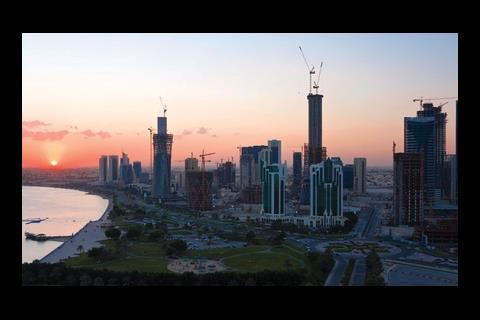
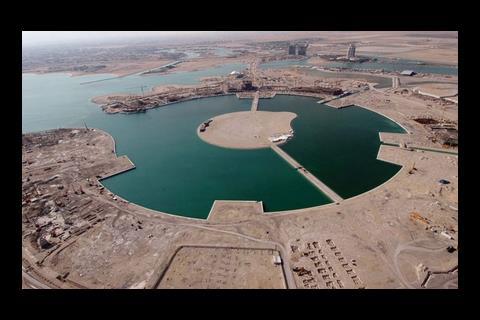
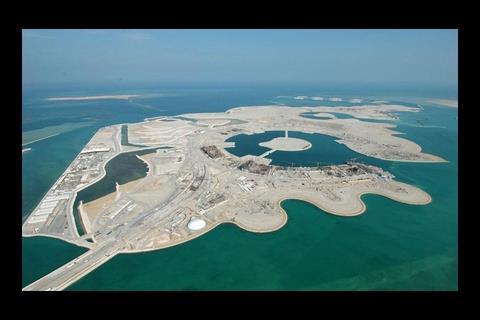
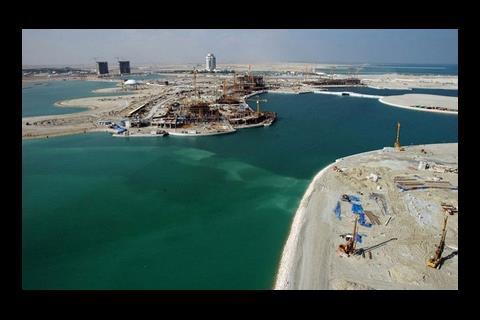
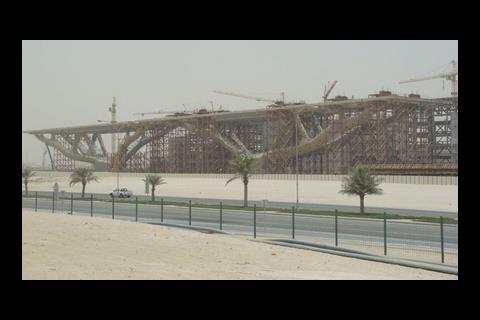













No comments yet